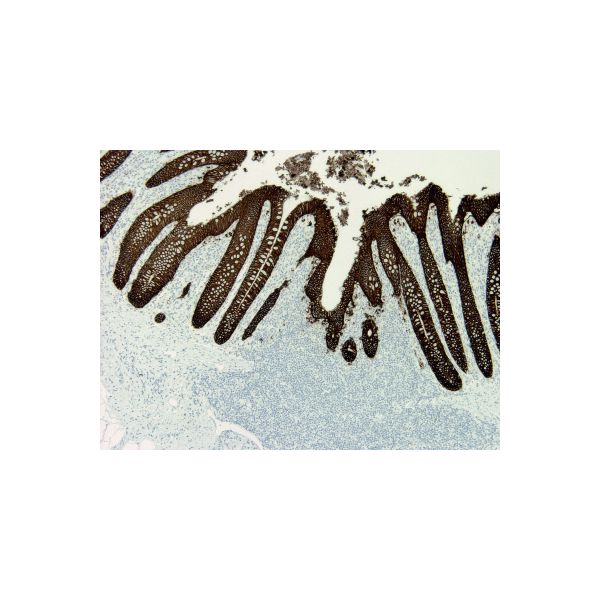Anti-CD326 EPCAM, mouse monoclonal, 1 ml, Species x-Reactivity: human, Applications: IHC
EPCAM (CD326)
Cat#: BSH-7402-100 100ul, BSH-7402-1 1ml, BSH-7402-RTU 7ml
Clone: BS14
S/R: human
Application: IHC
This gene encodes a carcinoma-associated antigen and is a member of a family that includes at least two type I membrane proteins. This antigen is expressed on most normal epithelial cells and gastrointestinal carcinomas and functions as a homotypic calcium-independent cell adhesion molecule. The antigen is being used as a target for immunotherapy treatment of human carcinomas. Mutations in this gene result in congenital tufting enteropathy.Tissue specificity: This protein is expressed in almost all epithelial cell membranes but not on mesodermal or neural cell membranes. Found on the surface of adenocarcinomas. EPCAM:Epithelial Cell Adhesion Molecule (EpCAM) is a 40 kDa cell surface antigen. This antigen has been identified independently by a number of groups, and has been known by a variety of names. Several monoclonal antibodies have been raised against EpCAM, many of which have been described as tumour specific molecules on carcinomas. EpCAM is a Type 1 transmembrane glycoprotein. It is expressed on the basolateral membrane of cells by the majority of epithelial tissues, with the exception of adult squamous epithelium and some specific epithelial cell types including hepatocytes and gastric epithelial cells. EpCAM expression has been reported to be a possible marker of early malignancy, with expression being increased in tumour cells, and de novo expression being seen in dysplastic squamous epithelium. This cell surface, glycosylated 40kD protein is highly expressed in the bone marrow, colon, lung, and most normal epithelial cells and is expressed on carcinomas of gastrointestinal origin.
 |
 |
 |
|
EPCAM (Clone: BS14) stained appendix tissue. Columnal epithelial cells of appendix have strong membranous label. |
EPCAM (Clone: BS14) stained renal cell carcinoma tissue. Neoplastic cells have strong to moderate membranous label. | EPCAM (Clone: BS14) stained basal cell carcinoma tissue. Neoplastic cells have strong membranous label. |
| Price | 2.970,00 RON (preturile sunt fara TVA) | ||||||
|---|---|---|---|---|---|---|---|
| Description |
EPCAM (CD326) Cat#: BSH-7402-100 100ul, BSH-7402-1 1ml, BSH-7402-RTU 7ml This gene encodes a carcinoma-associated antigen and is a member of a family that includes at least two type I membrane proteins. This antigen is expressed on most normal epithelial cells and gastrointestinal carcinomas and functions as a homotypic calcium-independent cell adhesion molecule. The antigen is being used as a target for immunotherapy treatment of human carcinomas. Mutations in this gene result in congenital tufting enteropathy.Tissue specificity: This protein is expressed in almost all epithelial cell membranes but not on mesodermal or neural cell membranes. Found on the surface of adenocarcinomas. EPCAM:Epithelial Cell Adhesion Molecule (EpCAM) is a 40 kDa cell surface antigen. This antigen has been identified independently by a number of groups, and has been known by a variety of names. Several monoclonal antibodies have been raised against EpCAM, many of which have been described as tumour specific molecules on carcinomas. EpCAM is a Type 1 transmembrane glycoprotein. It is expressed on the basolateral membrane of cells by the majority of epithelial tissues, with the exception of adult squamous epithelium and some specific epithelial cell types including hepatocytes and gastric epithelial cells. EpCAM expression has been reported to be a possible marker of early malignancy, with expression being increased in tumour cells, and de novo expression being seen in dysplastic squamous epithelium. This cell surface, glycosylated 40kD protein is highly expressed in the bone marrow, colon, lung, and most normal epithelial cells and is expressed on carcinomas of gastrointestinal origin.
|

 English
English




